(完整)一般现在时现在进行时语法(小学五年级下册)
- 格式:doc
- 大小:52.51 KB
- 文档页数:5
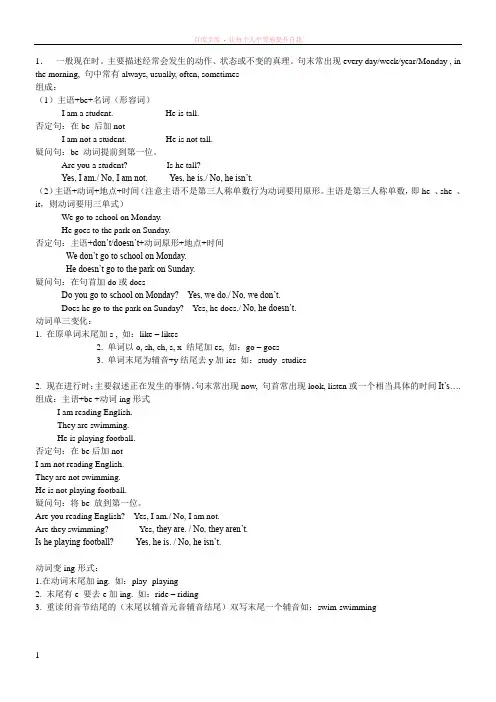
1.一般现在时。
主要描述经常会发生的动作、状态或不变的真理。
句末常出现every day/week/year/Monday , in the morning, 句中常有always, usually, often, sometimes组成:(1)主语+be+名词(形容词)I am a student. He is tall.否定句:在be 后加notI am not a student. He is not tall.疑问句:be 动词提前到第一位。
Are you a student? Is he tall?Yes, I am./ No, I am not. Yes, he is./ No, he isn’t.(2)主语+动词+地点+时间(注意主语不是第三人称单数行为动词要用原形。
主语是第三人称单数,即he 、she 、it,则动词要用三单式)We go to school on Monday.He goes to the park on Sunday.否定句:主语+don’t/doesn’t+动词原形+地点+时间We don’t go to school on Monday.He doesn’t go to the park on Sunday.疑问句:在句首加do或doesDo you go to school on Monday? Yes, we do./ No, we don’t.Does he go to the park on Sunday? Yes, he does./ No, he doesn’t.动词单三变化:1. 在原单词末尾加s , 如:like – likes2. 单词以o, sh, ch, s, x 结尾加es, 如:go – goes3. 单词末尾为辅音+y结尾去y加ies 如:study- studies2. 现在进行时:主要叙述正在发生的事情。
句末常出现now, 句首常出现look, listen或一个相当具体的时间It’s….组成:主语+be +动词ing形式I am reading English.They are swimming.He is playing football.否定句:在be后加notI am not reading English.They are not swimming.He is not playing football.疑问句:将be 放到第一位。
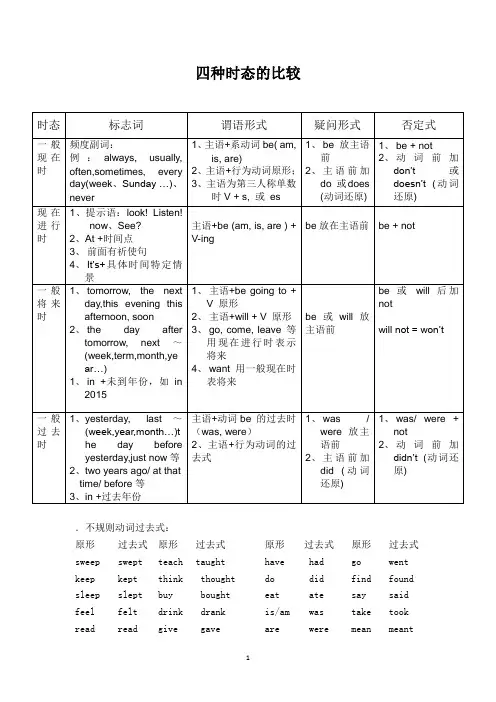
四种时态的比较.不规则动词过去式:原形过去式原形过去式原形过去式原形过去式sweep swept teach taught have had go went keep kept think thought do did find found sleep slept buy bought eat ate say said feel felt drink drank is/am was take took read read give gave are were mean meantput put sing sang drive drove meet met cut cut begin began speak spoke make made let let ring rang write wrote see saw fly flew run ran ride rode come came draw drew sit sat hear heard tell toldgrow grew learn learned/learntget got know knew一、用动词的适当形式填空1. My parents _______ (come) from Shandong.2. Sam _______(not like) playing computer games.3. The beautiful girl _______(wear) glasses.4. The Zhang family _______(live) in a flat in Nanjing.5. My father likes _______(read) newspapers after work.6. What _______her classmates _______(call) her teacher?7. _______ you _______(love) each other in your family?8. _______(be) your cousin very clever at maths?9. She is good at dancing. She ________ (sing) very well, too.11. Amy ________(take) her dog for a walk every afternoon.12. Mr. Li ________(not teach) us maths this term. (学期)13. Mr. Chen ________(not like) tea. He ________(enjoy) drinking coffee.14. ________ your father often ________(play) tennis ?No, he loves ________(read) newspapers.15. Everyone in our class ________(like) P.E. a lot.16. Who else ________(want) to come to Millie’s party? I ________.17. Many of them ________(work) hard at their lessons. They _____ (be) cl ever at them.18. What _______ Mary _______(have) for breakfast ?She _______(have) an egg and a glass of milk.19. Our school ________(be) a big nice school. And our teacher ______(be ) a good teacher.20. Simon and Daniel ________(be) American.二、句型转换。
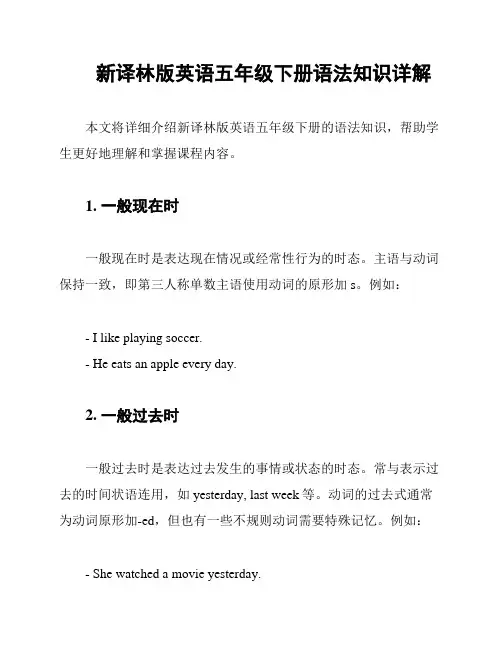
新译林版英语五年级下册语法知识详解本文将详细介绍新译林版英语五年级下册的语法知识,帮助学生更好地理解和掌握课程内容。
1. 一般现在时一般现在时是表达现在情况或经常性行为的时态。
主语与动词保持一致,即第三人称单数主语使用动词的原形加s。
例如:- I like playing soccer.- He eats an apple every day.2. 一般过去时一般过去时是表达过去发生的事情或状态的时态。
常与表示过去的时间状语连用,如yesterday, last week等。
动词的过去式通常为动词原形加-ed,但也有一些不规则动词需要特殊记忆。
例如:- She watched a movie yesterday.- They visited their grandparents last summer.3. 现在进行时现在进行时表示现在正在进行的动作或发生的事情。
由"be"动词加动词-ing形式构成。
例如:- We are studying English now.- He is playing soccer in the park.4. 情态动词情态动词是用来表示能力、请求、建议、许可、可能性等情态的词汇,常与动词原形搭配使用。
例如:- Can you help me with my homework?- You should eat more vegetables.5. 形容词比较级和最高级形容词比较级用于比较两个人或事物的程度,最高级则用于比较三个以上的人或事物的程度。
常通过在形容词后加-er或-est来构成。
例如:- This book is more interesting than that one.- He is the tallest boy in the class.以上是新译林版英语五年级下册的一些语法知识详解。
希望同学们能通过学习掌握这些知识,提高英语水平。
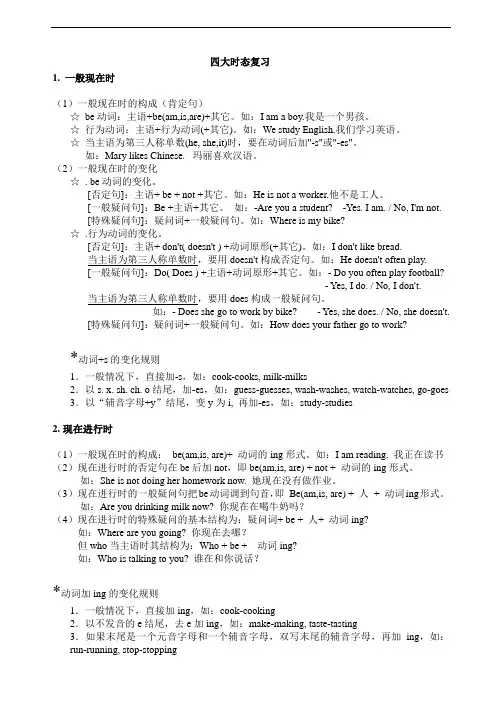
四大时态复习1. 一般现在时(1)一般现在时的构成(肯定句)☆be动词:主语+be(am,is,are)+其它。
如:I am a boy.我是一个男孩。
☆行为动词:主语+行为动词(+其它)。
如:We study English.我们学习英语。
☆当主语为第三人称单数(he, she,it)时,要在动词后加"-s"或"-es"。
如:Mary likes Chinese. 玛丽喜欢汉语。
(2)一般现在时的变化☆. be动词的变化。
[否定句]:主语+ be + not +其它。
如:He is not a worker.他不是工人。
[一般疑问句]:Be +主语+其它。
如:-Are you a student? -Yes. I am. / No, I'm not.[特殊疑问句]:疑问词+一般疑问句。
如:Where is my bike?☆.行为动词的变化。
[否定句]:主语+ don't( doesn't ) +动词原形(+其它)。
如:I don't like bread.当主语为第三人称单数时,要用doesn't构成否定句。
如:He doesn't often play.[一般疑问句]:Do( Does ) +主语+动词原形+其它。
如:- Do you often play football?- Yes, I do. / No, I don't.当主语为第三人称单数时,要用does构成一般疑问句。
如:- Does she go to work by bike? - Yes, she does. / No, she doesn't.[特殊疑问句]:疑问词+一般疑问句。
如:How does your father go to work?*动词+s的变化规则1.一般情况下,直接加-s,如:cook-cooks, milk-milks2.以s. x. sh. ch. o结尾,加-es,如:guess-guesses, wash-washes, watch-watches, go-goes 3.以“辅音字母+y”结尾,变y为i, 再加-es,如:study-studies2.现在进行时(1)一般现在时的构成:be(am,is, are)+ 动词的ing形式。
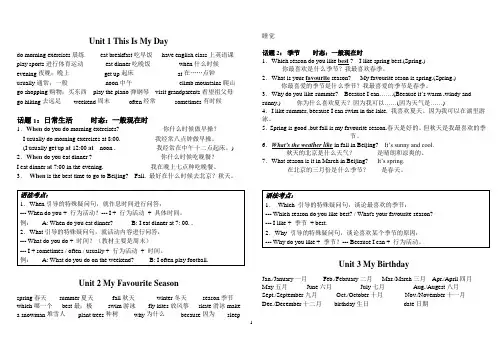
Unit 1 This Is My Daydo morning exercises晨练eat breakfast吃早饭have english class上英语课play sports进行体育运动eat dinner吃晚饭when什么时候evening夜晚;晚上get up起床at在……点钟usually通常;一般noon中午climb mountains爬山go shopping购物;买东西play the piano弹钢琴visit grandparents看望祖父母go hiking去远足weekend周末often经常sometimes有时候话题1:日常生活时态:一般现在时1.When do you do morning exercises? 你什么时候做早操?I usually do morning exercises at 8:00. 我经常八点钟做早操。
(I usually get up at 12:00 at noon . 我经常在中午十二点起床。
) 2.When do you eat dinner ? 你什么时候吃晚餐?I eat dinner at 7:00 in the evening. 我在晚上七点种吃晚餐。
3.When is the best time to go to Beijing? Fall. 最好在什么时候去北京?秋天。
Unit 2 My Favourite Seasonspring春天summer夏天fall秋天winter冬天season季节which哪一个best最;极swim游泳fly kites放风筝skate滑冰make a snowman堆雪人plant trees种树why为什么because因为sleep 睡觉话题2:季节时态:一般现在时1.Which season do you like best ? I like spring best.(Spring.)你最喜欢是什么季节?我最喜欢春季。

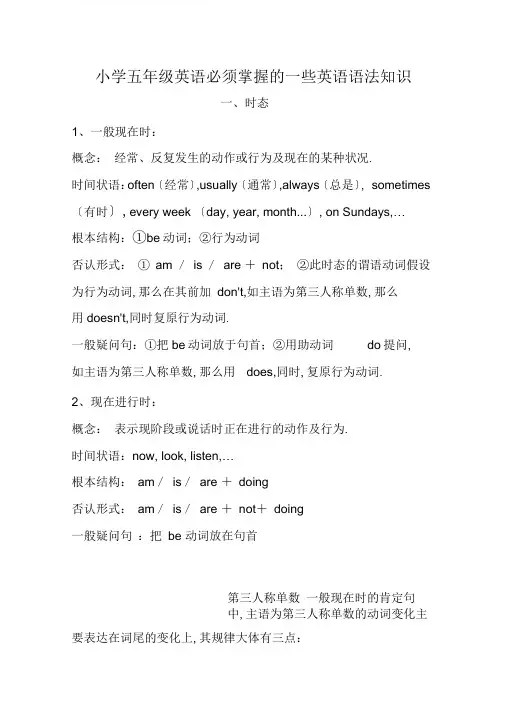
小学五年级英语必须掌握的一些英语语法知识一、时态1、一般现在时:概念:经常、反复发生的动作或行为及现在的某种状况.时间状语:often 〔经常〕,usually 〔通常〕,always 〔总是〕, sometimes 〔有时〕,every week 〔day, year, month...〕, on Sundays,…根本结构:①be动词;②行为动词否认形式:① am /is /are +not;②此时态的谓语动词假设为行为动词,那么在其前加don't,如主语为第三人称单数,那么用doesn't,同时复原行为动词.一般疑问句:①把be动词放于句首;②用助动词do提问,如主语为第三人称单数,那么用does,同时,复原行为动词.2、现在进行时:概念:表示现阶段或说话时正在进行的动作及行为.时间状语:now, look, listen,…根本结构:am/is/are +doing否认形式:am/is/are +not+doing一般疑问句:把be 动词放在句首第三人称单数一般现在时的肯定句中,主语为第三人称单数的动词变化主要表达在词尾的变化上,其规律大体有三点:1 . 一般情况下,直接在动词词尾+s ,例如:get-gets;take ftakes2 .以s, sh, ch, x, o结尾的动词,在词尾+ es,例如:teach - teaches; wash fwashes; go fgoes3 .以辅音字母+ y结尾的动词,变y为i,再+ es,如:study - studies; try -tries除上述规律外,还应注意下面三点:1. 动词have , 遇到主语是第三人称单数时, 要用has;动词be 的第三人称单数形式是is.2. 含有动词第三人称单数形式的句子变否认句时,要用doesn't + 动词原形,如:He goes to school at six in the morning.〔变否认句〕fHe doesn't go to school at six in the morning.3. 对含有动词第三人称单数形式的句子提问时, 要用助动词does,如:She goes home at five every day.〔对戈1J线局部提问〕-When / What time does she go home every day?三、名词复数1 、构成方法及读音规那么1)——般情况力口-s: map-maps boy-boys girl-girls pen-pensbag-bags car-cars清辅音后读/s/ 浊辅音和元音后读/z/2)以s, sh, ch, x 等结尾加"es,读/iz/bus-buses watch-watches box-boxes brush-brushes3)以辅音字母+y结尾,变y为i再加es,读/z/baby---babies city-cities country-countries但以y 结尾的专有名词,或元音字母+y 结尾的名词变复数时,直接加s 变复数.例如:two Marys the Henrys monkey---monkeysholiday---holidays4) 以o 结尾的名词,变复数时:a.无生命的名词,力口s,如:photo---photospiano---pianos radio---radios zoo---zoos;b.有生命的生物的名词, 力口es,如:potato-potatoes tomato--tomatoesc. 上述a 和b 两种方法均可,如zero---zeros / zeroes.5) 以f 或fe 结尾的名词变复数时:a.力口s,如:belief-beliefs roof---roofssafe---safes gulf---gulfs ;b. 去f,fe 力口ves, 如:half-halves knife——knivesleaf---leaves wolf---wolveswife---wives life---lives thief---thieves ;c. 上述a 和b 两种方法均可,如handkerchief: handkerchiefs / handkerchieves.6)名词复数的不规那么变化(1 ) child---children foot---feet tooth---teethmouse---mice man---men woman---women注意:由一个词加man 或woman 构成的合成词, 其复数形式也是-men 和-women,如an Englishman, two Englishmen. 但German 不是合成词, 故复数形式为Germans;Bowman 是姓,其复数是the Bowmans.(2) 单复同形, 如deer, sheep, fish , Chinese,Japanese ,li , jin , yuan, two li , three mu, four jin 等.但除人民币的元、角、分外, 美元、英镑、法郎等都有复数形式. 如: a dollar,two dollars; a meter, two meters .(3)集体名词,以单数形式出现,但实为复数.例如:people police cattle 等本身就是复数,不能说 a people, a police, a cattle, 但可以说a person, a policeman, a headof cattle.(4) 以s 结尾,仍为单数的名词,如:a. maths, politics , physics 等学科名词,一般是不可数名词,为单数.b. news 为不可数名词.c. the United States, the United Nations 应视为单数.The United Nations was organized in 1945. 联合国是1945 年组建起来的.d. 以复数形式出现的书名,剧名,报纸,杂志名,也可视为单数.例如:"The Arabian Nights" is a very interesting story-book. ?一千零一夜?是一本非常有趣的故事书.5〕表示由两局部构成的东西,如:glasses 〔眼镜〕trousers, clothes 等,假设表达具体数目,要借助数量词pair 〔对,双〕; suit 〔套〕;a pair of glasses; two pairs of trousers 等.6〕另外还有一些名词,其复数形式有时可表示特别意思,如:goods货物,waters水域,fishes 〔各种〕鱼.1.3 不可数名词量的表示1〕物质名词a. 当物质名词转化为个体名词时为可数.比拟:Cake is a kind of food. 蛋糕是一种食物. 〔不可数〕These cakes are sweet. 这些蛋糕很好吃.〔可数〕b. 当物质名词表示该物质的种类时,可数.例如:This factory produces steel. 〔不可数〕We need various steels. 〔可数〕c. 当物质名词表示份数时,可数.例如:Our country is famous for tea. 我国因茶叶而闻名.Two teas, please. 请来两杯茶.2〕抽象名词表示具体的事例时也可数.例如:four freedoms 四大自由the four modernizations 四个现代化物质名词和抽象名词可以借助单位词表一定的数量,如a glass of water a piece of advicea pile of caol a flash of lightening a burst of laughter1.4 定语名词的复数名词作定语一般用单数,但也有以下例外.1)用复数作定语.例如:sports meeting 运动会students reading-room 学生阅览室talks table 谈判桌the foreign languages department 外语2) man, woman, gentleman 等作定语时,其单复数以所修饰的名词的单复数而定.例如:men workers women teachers gentlemen officials3)有些原有s结尾的名词,作定语时,s保存.例如:goods train 〔货车〕arms produce 武器生产customs papers 海关文件clothes brush 衣刷4〕数词+名词作定语时,这个名词一般保存单数形式.例如:two-dozen eggs 两打鸡蛋 a ten-mile walk 十英里路two-hundred trees 两百棵树 a five-year plan. 一个五年方案1.5 不同国籍人的单复数国籍中国人瑞士人澳大利亚人俄国人总称〔谓语用复数〕the Chinese the Swiss the Australians the Russians单数a Chinese a Swiss an Australian a Russian复数two Chinese two Swiss two Australians two Russians意大利人希腊人法国人日本人美国人the Italians the Greek the French the Japanese the Americansan Italian a Greek a Frenchman a Japanese an Americantwo Italians two Greeks two Frenchmen two Japanese two Americans印度人加拿大人德国人英国人瑞典人the Indians the Canadians the Germans the English the Swedishan Indian a Canadian a Germans an Englishman a Swede two Indians two Canadians two Germans two Englishmen two Swedes名称总称〔谓语用复数〕一个人两个人中国人the Chinese a Chinese two Chinese瑞士人the Swiss a Swiss two Swiss澳大利亚人the an twoAustralians Australian Australians俄国人the Russians a Russian two Russians意大利人the Italians an Italian two Italians希腊人the Greek a Greek two Greeks法国人the French a Frenchman twoFrenchmenthe Japanese a Japanese two Japanese 美国人the Americans an American two Americans印度人the Indians an Indian two Indians加拿大人the Canadians a Canadian two Canadians德国人the Germans a German two Germans英国人the English an Englishman twoEnglishmen瑞典人the Swedish a Swede two Swedes四、名词所有格在英语中,有些名词可以加’S 来表示所有关系,带这种词尾的名词形式称为该名词的所有格.例如: a teacher ’ s bo. ok下1 名词所有格的构成法The children ' s house is near Tom些孩子胆家靠近汤姆的家.1名词+ ’sa.单数名词词尾加’,s复数名词词尾如没有s,也要加‘cs the boy ' s bOg该的书包Mike ' s knife迈克的刀子the Children ' s gala年宫men' s room 男厕所b.表示几个人共有一样东西,只需在最后一个人的名字后 加 ’s .如表示各自所有,那么需在各个名字后加 ’s .如: These are Tom ' s and Jason ' SrOomS. 姆和杰森各自 的房间.、,、、'? ?• 4注意 在某些句子里,名词所有格修饰的词,往往可以省略. John s bike is better than Mike约翰的自行车比迈克的好.c.假设名词已有复数词尾-s,只加’、,、、'? ?• 4注意2 .名词 +of +名词名词是有生命的,我们用 ’s 结构来表示所有关系.如果名词 是无生命的, 我们就要用名词 +of +名词的结构来表示所有关 the windows of the house 房间的窗户the title of the song 歌的题目the picture of the family 家庭照片、,、、'? ?• 4注意a 在表示名词所有格时,’转构可以转换成of 结构 the girl ' s name This is Tom and Jason 's 遹om.姆和杰森共有的房间 the workers 'struggle 的斗争the teachersre-arodoinmg 教员阅览室 名词所有格词尾的读音与名词复数词尾 -s 的读音相同.-the name of t鹿宓的名字the friend of my father亲的朋友'my father ’ s friendb.有些表示时间、距离、国家、城市等无生命的东西的名词, 也可以加’s 来构成所有格.Beijing ' s stree京的街道today ' s newspaper 天的报纸ten minutes ' wOl价钟的路程The childr en ’ s house is near Tom 这些孩子的家靠近汤姆的’ s.家.五、助动词1)协助主要动词构成谓语动词词组的词叫助动词( Auxiliary Verb ) . 被协助的动词称作主要动词 ( MainVerb ) .构成时态,语态是助动词助动词是语法功能词,自身没有词义,不可单独使用,它没有对应的汉译,例如:He doesn't like English. 他不喜欢英语.(doesn't是助动词,无词义;like是主要动词,有词义)2) 助动词协助主要动词完成以下功用,可以用来:a. 表示时态,例如:He is singing. 他在唱歌.He has got married. 他已结婚.b. 表示语态,例如:He was sent to England. 他被派往英国.c. 构成疑问句,例如:Do you like college life? 你喜欢大学生活吗?Did you study English before you came here? 你来这儿之前学过英语吗?d. 与否认副词not 合用,构成否认句,例如:I don't like him. 我不喜欢他.e. 增强语气,例如:Do come to the party tomorrow evening. 明天晚上一定来参加晚会.He did know that. 他确实知道那件事.3) 最常用的助动词有:be, have, do, shall, will, should, would助动词am,is,are 的用法am,is,are +现在分词,构成进行时态,例如:They are having an English class. 他们正在上一堂英语助动词have 的用法主语是单数或第三人称时,谓语动词用has;主语是复数或第一二人称时用have助动词do 的用法1) 构成一般疑问句,例如:Do you want to pass the CET? 你想通过大学英语测试吗?Did you study English? 你们学过德语吗?2) do + not 构成否认句,例如:I do not want to be late. 我不想迟到.He doesn't like to study. 他不想学习.3) 构成否认祈使句,例如:Don't open the door. 不要开门.Don't be late again. 不要再迟到了.4) 用作代动词,例如:--- Do you like Beijing? --你喜欢北京吗?--- Yes, I do. --是的, 喜欢. ( do 用作代动词, 代替like Beijing. )He knows how to drive a car, doesn't he?他知道如何开车,对吧?助动词shall 和will 的用法shall 和will 作为助动词可以与动词原形一起构成一般将来时,例如:I shall study harder at English. 我将更加努力地学习英语.He will go to Shanghai. 他要去上海.说明:在过去的语法中,语法学家说shall 用于第一人称, will 只用于第二、第三人称.现在,尤其是在口语中, will 常用于第一人称, 但shall 只用于第一人称, 如用于第二、第三人称,就失去助动词的意义,已变为情态动词,试比拟: He shall come. 他必须来.〔shall 有命令的意味.〕He will come. 他要来. 〔will 只与动词原形构成一般将来时.〕助动词should,would 的用法1)s hould 无词义,只是shall 的过去形式,与动词原形构成过去将来时,只用于第一人称,例如:I telephoned him yesterday to ask what I should do next week.我昨天给他打 ,问他我下周干什么.比拟:What shall I do next week?" I asked."我下周干什么?"我问道.〔可以说,shall变成间接引语时,变成了should.〕2)would也无词义,是will的过去形式,与动词原形构成过去将来时,用于第二、第三人称,例如:He said he would come. 他说他要来.比拟:"I will go," he said.他说:"我要去那儿."变成间接引语,就成了:He said he would come.原来的will变成would , go变成了come..六、人称代词表格主格宾格形容词性物主代词名词性物主代词弟人称F数I我me我my 我的mine 我的,数we 我们us 我们our 我们的ours 我们的第二人称you 你you 你your 你的yours 你的,数you你们you你们you你们的yours 你们的第三 k 称k he 他 him 他 his 他的 his 他的 she 她 her 她 her 她的 hers 她的 it 它 it 它 its 它的 its 它的 kthey 他们、 她们、它们them 他 们、 她们、它们their〔他、她、 它〕们的theirs〔他、她、它〕 们的七、形容词和副词 〔一〕、形容词及其用法形容词修饰名词,说明事物或人的性质或特征.通常,可 将形容词分成性质形容词和表达形容词两类,其位置不一定 都放在名词前面. 1〕直接说明事物的性质或特征的形容词是性质形容词,它有级的变化,可以用程度副词修饰,在句中可作定语、表语和 补语.例如:hot 热的.2〕表达形容词只能作表语, 所以又称为表语形容词. 这类形 容词没有级的变化,也不可用程度副词修饰.大多数以 a 开头的形容词都属于这一类.例如: afraid 害怕的. 〔错〕 He is an 川 man.〔对〕 The man is ill.〔错〕 She is an afraid girl. 〔对〕 The girl is afraid.这类词还有:well , unwell , ill , faint, afraid, alike, alive, alone, asleep, awake 等.3〕形容词作定语修饰名词时,要放在名词的前边.但是如果形容词修饰以-thing 为字尾的词语时, 要放在这些词之后, 例如:something nice4.2 以-ly 结尾的形容词1)大局部形容词加-ly 可构成副词.但friendly , deadly, lovely , lonely , likely , lively , ugly, brotherly ,仍为形容词.改错:〔错〕S he sang lovely.〔错〕He spoke to me very friendly.〔对〕Her singing was lovely.〔对〕He spoke to me in a very friendly way.2〕有些以-ly 结尾既为形容词,也为副词.daily, weekly , monthly , yearly, earlyThe Times is a daily paper.The Times is published daily.4.3 用形容词表示类别和整体1)某些形容词加上定冠词可以泛指一类人,与谓语动词的复数连接. 如:the dead, the living , the rich, the poor, the blind ,the hungryThe poor are losing hope.2)有关国家和民族的形容词加上定冠词指这个民族的整体,与动词的复数连用.the British , the English , the French, the Chinese.The English have wonderful sense of humor.多个形容词修饰名词时,其顺序为:限定词--数词--描绘词--〔大小,长短,形状,新旧,颜色〕 --出处--材料性质,类别--名词a small round tablea tall gray buildinga dirty old brown shirta famous German medical schoolan expensive Japanese sports car一般与被修饰形容词关系密切的形容词靠近名词;如果几个形容词的重要性差不多,音节少的形容词在前,音节多的方在后,在不能确定时,可参照下表:限定词+数量词〔序数词在前,基数词在后〕+性状形容词+大小、长短、上下等形体+those + three + beautiful + large + square新旧+颜色+国籍+材料+名词old + brown + wood + table4.5 副词及其根本用法副词主要用来修饰动词,形容词,副词或其他结构.一、副词的位置:1) 在动词之前.2) 在be 动词、助动词之后.3) 多个助动词时,副词一般放在第一个助动词后.、/、、1 ? >• a注意:a. 大多数方式副词位于句尾,但宾语过长,副词可以提前,以使句子平衡.We could see very clearly a strange light ahead of us.b. 方式副词well , badly 糟、坏, hard 等只放在句尾.He speaks English well.二、副词的排列顺序:1) 时间,地点副词,小单位的在前,大单位在后.2) 方式副词,短的在前,长的在后,并用and 或but 等连词连接.Please write slowly and carefully.3) 多个不同副词排列:程度+地点+方式+时间副词.注意:副词very 可以修饰形容词,但不能修饰动词.改错:(错) I very like English.(对) I like English very much.注意:副词enough 要放在形容词的后面,形容词enough 放在名词前后都可.I don't know him well enough.There is enough food for everyone to eat.There is food enough for everyone to eat.4.6 兼有两种形式的副词1) close 与closelyclose 意思是"近";c losely 意思是"仔细地"He is sitting close to me.Watch him closely.2) late 与latelylate 意思是"晚";lately 意思是"最近"You have come too late.What have you been doing lately?3) deep 与deeplydeep意思是"深",表示空间深度;deeply时常表示感情上的深度, "深深地"He pushed the stick deep into the mud.Even father was deeply moved by the film.4) high 与highlyhigh 表示空间高度;highly 表示程度,相当于muchThe plane was flying high.I think highly of your opinion.5) wide 与widelywide 表示空间宽度;widely 意思是"广泛地", "在许多地方" He opened the door wide.English is widely used in the world.6) free 与freelyfree 的意思是"免费";freely 的意思是"无限制地"You can eat free in my restaurant whenever you like.You may speak freely; say what you like.。
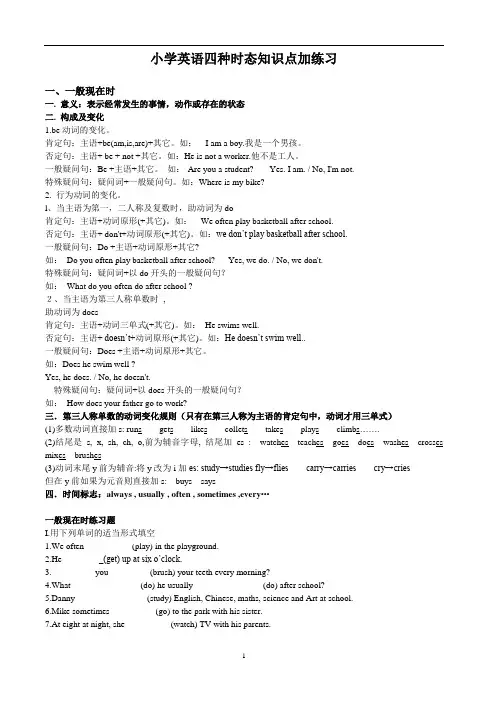
小学英语四种时态知识点加练习一、一般现在时一. 意义:表示经常发生的事情,动作或存在的状态二. 构成及变化1.be动词的变化。
肯定句:主语+be(am,is,are)+其它。
如:I am a boy.我是一个男孩。
否定句:主语+ be + not +其它。
如:He is not a worker.他不是工人。
一般疑问句:Be +主语+其它。
如:-Are you a student? -Yes. I am. / No, I'm not.特殊疑问句:疑问词+一般疑问句。
如:Where is my bike?2. 行为动词的变化。
l、当主语为第一,二人称及复数时,助动词为do肯定句:主语+动词原形(+其它)。
如:We often play basketball after school.否定句:主语+ don't+动词原形(+其它)。
如:we don’t play basketball after school.一般疑问句:Do +主语+动词原形+其它?如:Do you often play basketball after school? Yes, we do. / No, we don't.特殊疑问句:疑问词+以do开头的一般疑问句?如:What do you often do after school ?2、当主语为第三人称单数时,助动词为does肯定句:主语+动词三单式(+其它)。
如:He swims well.否定句:主语+ doesn’t+动词原形(+其它)。
如:He doesn’t swim well..一般疑问句:Does +主语+动词原形+其它。
如:Does he swim well ?Yes, he does. / No, he doesn't.特殊疑问句:疑问词+以does开头的一般疑问句?如:How does your father go to work?三.第三人称单数的动词变化规则(只有在第三人称为主语的肯定句中,动词才用三单式)(1)多数动词直接加s: runs gets likes collets takes plays climbs…….(2)结尾是s, x, sh, ch, o,前为辅音字母, 结尾加es :watches teaches goes does washes crosses mixes brushes(3)动词末尾y前为辅音:将y改为i加es: study→studies fly→flies carry→carries cry→cries但在y前如果为元音则直接加s:buys says四.时间标志:always , usually , often , sometimes ,every…一般现在时练习题I.用下列单词的适当形式填空1.We often___________(play) in the playground.2.He _________(get) up at six o’clock.3.__________you _________(brush) your teeth every morning?4.What________________(do) he usually________________(do) after school?5.Danny ________________(study) English, Chinese, maths, science and Art at school.6.Mike sometimes __________(go) to the park with his sister.7.At eight at night, she __________(watch) TV with his parents.8.________ Mike________(read) English every day?9.How many lessons_________your classmates________(have) on Monday?10.What time_________his mother_________(do) the housework?II.改句子1.Do you often play football after school? (改为肯定句)2.I have many books.(改为否定句)3.Gao Shan’s sister likes playing table tennis (改为否定句)4.She lives in a small town near New York.(改为一般疑问句)5.I watch TV every day.(改为一般疑问句)6.We have four lessons.(改为否定句)7.Nancy doesn’t run fast (改为肯定句)二、现在进行时一、概念现在进行时表示说话时正在进行或发生的动作,也可表示当前一段时间内的活动或现阶段正在进行的动作。
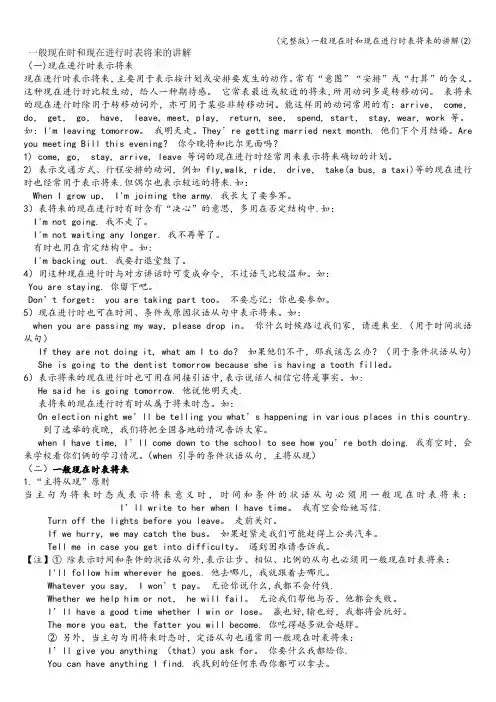
一般现在时和现在进行时表将来的讲解(一)现在进行时表示将来现在进行时表示将来,主要用于表示按计划或安排要发生的动作。
常有“意图”“安排”或“打算”的含义。
这种现在进行时比较生动,给人一种期待感。
它常表最近或较近的将来,所用动词多是转移动词。
表将来的现在进行时除用于转移动词外,亦可用于某些非转移动词。
能这样用的动词常用的有:arrive, come,do, get, go, have, leave, meet, play, return, see, spend, start, stay, wear, work 等。
如:I'm leaving tomorrow。
我明天走。
They’re getting married next month. 他们下个月结婚。
Are you meeting Bill this evening?你今晚将和比尔见面吗?1) come, go, stay, arrive, leave 等词的现在进行时经常用来表示将来确切的计划。
2) 表示交通方式、行程安排的动词,例如 fly,walk, ride, drive, take(a bus, a taxi)等的现在进行时也经常用于表示将来.但偶尔也表示较远的将来.如:When I grow up, I'm joining the army. 我长大了要参军。
3)表将来的现在进行时有时含有“决心”的意思,多用在否定结构中.如:I'm not going. 我不走了。
I'm not waiting any longer. 我不再等了。
有时也用在肯定结构中。
如:I'm backing out. 我要打退堂鼓了。
4)用这种现在进行时与对方讲话时可变成命令,不过语气比较温和。
如:You are staying. 你留下吧。
Don’t forget: you are taking part too。
不要忘记:你也要参加。
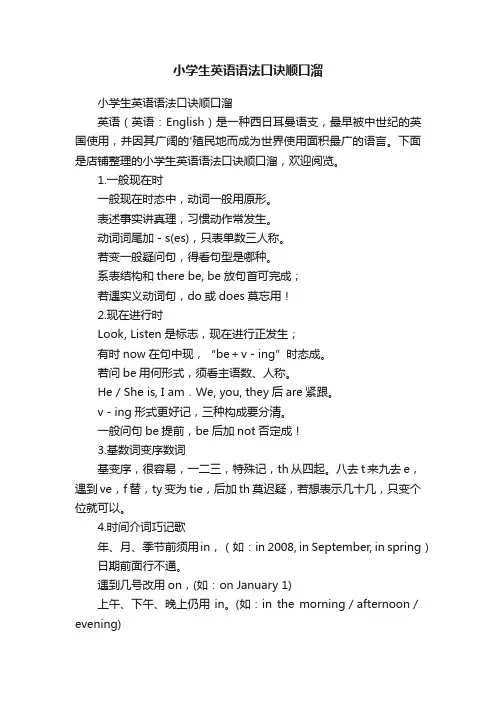
小学生英语语法口诀顺口溜
小学生英语语法口诀顺口溜
英语(英语:English)是一种西日耳曼语支,最早被中世纪的英国使用,并因其广阔的'殖民地而成为世界使用面积最广的语言。
下面是店铺整理的小学生英语语法口诀顺口溜,欢迎阅览。
1.一般现在时
一般现在时态中,动词一般用原形。
表述事实讲真理,习惯动作常发生。
动词词尾加-s(es),只表单数三人称。
若变一般疑问句,得看句型是哪种。
系表结构和there be, be放句首可完成;
若遇实义动词句,do或does莫忘用!
2.现在进行时
Look, Listen是标志,现在进行正发生;
有时now在句中现,“be+v-ing”时态成。
若问be用何形式,须看主语数、人称。
He/She is, I am.We, you, they后are紧跟。
v-ing形式更好记,三种构成要分清。
一般问句be提前,be后加not否定成!
3.基数词变序数词
基变序,很容易,一二三,特殊记,th从四起。
八去t来九去e,遇到ve,f替,ty变为tie,后加th莫迟疑,若想表示几十几,只变个位就可以。
4.时间介词巧记歌
年、月、季节前须用in,(如:in 2008, in September, in spring)日期前面行不通。
遇到几号改用on,(如:on January 1)
上午、下午、晚上仍用in。
(如:in the morning/afternoon/evening)
【小学生英语语法口诀顺口溜】。
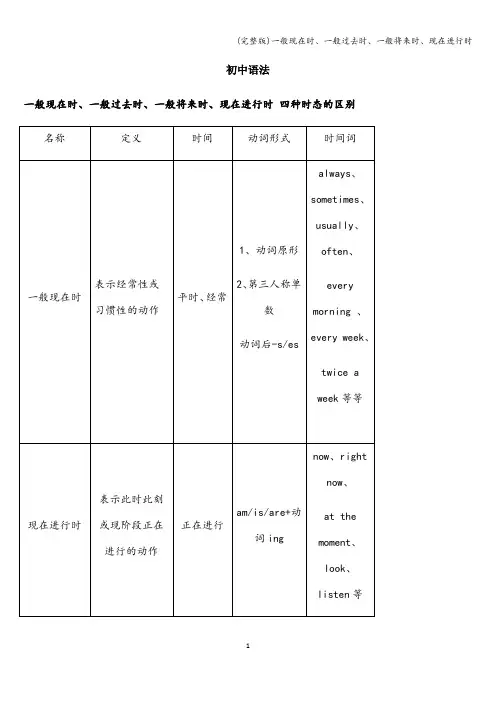
初中语法一般现在时、一般过去时、一般将来时、现在进行时四种时态的区别注意:1、一般现在时——第三人称单数的动词变化规则:1)大多数动词在词尾加“S"如:stop-______ ; make-______ read-______ ; play-______2)以辅音字母加“y”结尾的,要先将“y”变为“i",然后在加“es”如:fly-______ ; carry-______ study-______ ; worry-______3)以“s, x, ch, sh”结尾的,在词尾加“es"如:teach-______ ; watch-______4)以“o”结尾的动词,加“es”如:go-______ do-______2、现在进行时——动词ing形式的变化规则1.一般动词直接在词尾+ing例:read→______ (读) talk→______(交谈) sing→______(唱歌)2。
以不发音e结尾的动词,先去e再加ing例:like→______喜欢 write→______写 skate→______(滑冰)3。
以重读闭音节结尾且末尾只有一个辅音字母的动词,双写末尾字母,再加ing 例:stop→______(停止) get→______(得到)4.少数几个以ie结尾的动词,变ie为f再加ing.例:lie→______(躺、撒谎) tie→______(系、捆绑)3、一般过去时——动词的变化规则(1)一般在动词后加-ed。
如:play-______, offer-______, weigh—______, destroy—______, sign—______(2)在以字母e结尾的动词后,只加-d。
如:like—______, provide-______, hate - ______ date-______(3) 在以“辅音字母+y”结尾的动词后,则改y为i,再加—ed。
五年级下册英语重点语法解析:一般现在时小学五年级英语下册有三大重点语法:一般现在时、一般进行时、一般将来时。
这三大时态是我们学好英语的基础,必须要牢牢掌握。
助手将和大家详细解析以上三大时态的用法,今天我们先来学习“一般现在时”。
一般现在时是小学英语的重要语法知识点,也是上了初中后要学习的最重要的语法内容之一。
一般现在时主要用来表示经常性或习惯性的动作,或者是现在的特征或所处的状态。
一般现在时看似最简单,其实它和其它时态最不一样。
其它时态说的都是具体时间发生的具体事件,而一般现在时强调的是一段时间内的状态或反复发生的动作,即客观事实。
1. 谓语是be(am/is/are)的一般现在时。
①肯定形式:主语+be+表语(形容词、名词充当表语)。
I am hungry.You are beautiful.He is a doctor.②否定形式:主语+be+not+表语(形容词、名词充当表语)。
I am not hungry.You aren't beautiful.He isn't a doctor.③一般疑问句形式:Be+主语+表语(形容词、名词充当表语)? 肯定回答:Yes,主语+be. 否定回答:No, 主语+ be+not.—Are you hungry?—Yes,I am./No,I'm not.—Is he a doctor?—Yes, he is./No, he isn,t.④特殊疑问句形式:特殊疑问词+Be开头的一般疑问句?—What is he?—He is a doctor.注意:be要随着主语变。
2. 谓语是情态动词can/may.....+动词原形的一般现在时。
①肯定形式:主语+情态动词can/may.....+动词原形+宾语。
I can finish my homework.②否定形式:主语+情态动词can/may.....+not+动词原形+宾语。
I can't finish my homework.③一般疑问句形式:情态动词Can/May.....+主语+动词原形+主语+宾语。
四种时态的比较.不规则动词过去式:原形过去式原形过去式原形过去式原形过去式sweep swept teach taught have had go went keep kept think thought do did find found sleep slept buy bought eat ate say said feel felt drink drank is/am was take took read read give gave are were mean meantput put sing sang drive drove meet met cut cut begin began speak spoke make made let let ring rang write wrote see saw fly flew run ran ride rode come came draw drew sit sat hear heard tell toldgrow grew learn learned/learntget got know knew一、用动词的适当形式填空1. My parents _______ (come) from Shandong.2. Sam _______(not like) playing computer games.3. The beautiful girl _______(wear) glasses.4. The Zhang family _______(live) in a flat in Nanjing.5. My father likes _______(read) newspapers after work.6. What _______her classmates _______(call) her teacher?7. _______ you _______(love) each other in your family?8. _______(be) your cousin very clever at maths?9. She is good at dancing. She ________ (sing) very well, too.11. Amy ________(take) her dog for a walk every afternoon.12. Mr. Li ________(not teach) us maths this term. (学期)13. Mr. Chen ________(not like) tea. He ________(enjoy) drinking coffee.14. ________ your father often ________(play) tennis ?No, he loves ________(read) newspapers.15. Everyone in our class ________(like) P.E. a lot.16. Who else ________(want) to come to Millie’s party? I ________.17. Many of them ________(work) hard at their lessons. They _____ (be) cl ever at them.18. What _______ Mary _______(have) for breakfast ?She _______(have) an egg and a glass of milk.19. Our school ________(be) a big nice school. And our teacher ______(be ) a good teacher.20. Simon and Daniel ________(be) American.二、句型转换。
现在进行时、一般将来时第1页共1页一、现在进行时,谓语由be+现在分词构成。
一般现在时现在进行时I run near my home every morning.I'm running near my home.They always play football in Sunday afternoon.They are playing football.She sometimes goes to library by bus.She is going to library by bus.二、一般将来时,谓语动词由①情态动词shall 、will+动词原形构成;②动词短语be going to+动词原形构成。
说明一说明二情态动词shall+动词原形主语是第一人称1、be going to 中的go 不是实义动词,是情态动词,不能翻译成“去”,只能翻译成“将”;2、与go 类似使用的动词还有come 、leave 、start 等,如be coming to 、be leaving to 也表达“即将”的意思;3、与shall 、will 相比,be going to 形式的一般将来时表达一种不久、很快即将发生的动作。
情态动词will+动词原形主语不是第一人称动词短语be going to+动词原形人称不限定示例:一般现在时一般将来时I run near my home every morning.I shall run near my home next minute.They always play football in Sunday afternoon.They will play football on Sunday afternoon.She sometimes goes to library by bus.She is going to go library by bus.说明:在现在进行时She is going to library by bus.中,going是实义动词“去”的意思,后接名词。
英语五年级下册语法知识要点一、一般现在时1、概念:表示人或事物的特征、状态,以及动作的客观事实或主观想法。
2、时间状语:always,usually,often,sometimes,seldom,never,every day,month,year,often。
3、基本结构:主语+be动词/行为动词+其他成分。
4、否定形式:主语+be动词/助动词+not+其他成分。
5、一般疑问句:be动词/助动词+主语+其他成分?6、特殊疑问句:疑问词+be动词/助动词+主语+其他成分?二、现在进行时1、概念:表示正在进行的动作或存在的状态。
2、时间状语:now,right now,at this moment。
3、基本结构:主语+be动词+动词ing+其他成分。
4、否定形式:主语+be动词+not+动词ing+其他成分。
5、一般疑问句:be动词+主语+其他成分?6、特殊疑问句:疑问词+be动词+主语+其他成分?三、一般将来时1、概念:表示将来要发生的动作或存在的状态。
2、时间状语:tomorrow,next day,in a week,in the future。
3、基本结构:主语+be going to/will/be to+动词原形+其他成分。
4、否定形式:主语+be going to/will/be to+not+动词原形+其他成分。
5、一般疑问句:be going to/will/be to+主语+动词原形+其他成分?6、特殊疑问句:疑问词+be going to/will/be to+主语+动词原形+其他成分?四、现在完成时1、概念:表示过去的动作对现在造成的影响或过去的动作持续到现在。
2、时间状语:already,before,just,lately,never,ever,since,for a long time。
3、基本结构:主语+have/has+动词过去分词+其他成分。
4、否定形式:主语+have/has+not+动词过去分词+其他成分。
1.一般现在时。
主要描述经常会发生的动作、状态或不变的真理。
句末常出现every day/week/year/Monday , in the morning, 句中常有always, usually, often, sometimes组成:(1)主语+be+名词(形容词)I am a student. He is tall.否定句:在be 后加notI am not a student. He is not tall.疑问句:be 动词提前到第一位。
Are you a student? Is he tall?Yes, I am./ No, I am not. Yes, he is./ No, he isn’t.(2)主语+动词+地点+时间(注意主语不是第三人称单数行为动词要用原形。
主语是第三人称单数,即he 、she 、it,则动词要用三单式)We go to school on Monday.He goes to the park on Sunday.否定句:主语+don’t/doesn’t+动词原形+地点+时间We don’t go to school on Monday.He doesn’t go to the park on Sunday.疑问句:在句首加do或doesDo you go to school on Monday? Yes, we do./ No, we don’t.Does he go to the park on Sunday? Yes, he does./ No, he doesn’t.动词单三变化:1. 在原单词末尾加s , 如:like – likes2. 单词以o, sh, ch, s, x 结尾加es, 如:go – goes3. 单词末尾为辅音+y结尾去y加ies 如:study- studies2. 现在进行时:主要叙述正在发生的事情。
句末常出现now, 句首常出现look, listen或一个相当具体的时间It’s….组成:主语+be +动词ing形式I am reading English.They are swimming.He is playing football.否定句:在be后加notI am not reading English.They are not swimming.He is not playing football.疑问句:将be 放到第一位。
Are you reading English? Yes, I am./ No, I am not.Are they swimming? Yes, they are. / No, they aren’t.Is he playing football? Yes, he is. / No, he isn’t.动词变ing形式:1.在动词末尾加ing. 如:play- playing2. 末尾有e 要去e加ing. 如:ride – riding3. 重读闭音节结尾的(末尾以辅音元音辅音结尾)双写末尾一个辅音如:swim-swimming用所给的词的适当形式填空:1.Listen, Jim _is singing (sing) an English song in the music room.解析:1) 由Listen决定用现在进行时,be doing 2) Jim 第三人称单数故:is singing2. Wang Bing _likes (like) making (make) model ships.解析:1) 喜欢做某一件事,用一般现在时。
2)Wang Bing 第三人称单数故:likes3) like 加动词具定搭配like doing 或like to do 故:making 或:to make3. I live (live) in Nan Jing , but my friend lives (live) in England.解析:1) 居住在某地,是一种事实状态,故用一般现在时。
2)I 非第三人称单数用like. 3)my friend 第三人称单数用likes4. My father likes (like) reading (read) newspaper, but my mother doesn’t (not)解析:1) 喜欢做某一件事,用一般现在时。
2)my father 第三人称单数故:likes3) like 加动词具定搭配like doing 或like to do 故:reading 或:to read. 4) my mother 第三人称单数否定,故相应的用doesn’t5. It’s two o’clock in the afternoon. We _are having__ (have) an English class now.解析:1)It’s two o’clock in the afternoon. 决定用现在进行时,be doing 2) we 非第三人称单数故:are having6. I like _singing__(sing), she _likes__(like)__dancing___(dance).解析:喜欢做某一件事,用一般现在时。
2)she 第三人称单数故:likes3) like 加动词具定搭配like doing 或like to do 故:singing 或:to sing. dancing 或:to dance.7. What does Helen often do (do) at the weekends? She often catches (catch) insects.解析:1) 由often 决定用一般现在时。
2)Helen 第三人称单数故:does 3) does后面跟的动司为原形, 故do 4) She 第三人称单数故:catches8. He doestn’t (do not) want to eat (eat) bread for breakfast.解析:1) 想做某事,一般现在时。
2)he 第三人称单数故:doesn’t3) want 固定搭配to do 故:to eat9. I _______(have) a friend. Her name ______(be)Susan. She _____(like) singing and dancing解析:1) 有一个朋友,用一般现在时。
2)I 非第三人称单数故:have3) her name 第三人称单数故:is 4) she 第三人称单数故:likes10. Does Yang Ling have (have) any (some) hobbies? Yes, she does.解析:1) 有什么兴趣爱好,用一般现在时。
2)Yang Lin第三人称单数故:does3) does后面跟的动司为原形, 故have 4) some 在一般疑问句中改为any 4)相应的肯定回答,三单式用Yes, she does.11. Where are (be) Helen and Tom from? They are (be) from America (American)?解析:1) 来自那里,用一般现在时。
2)Helen and Tom 或they 都是二个人或以上,故are 3)America是美国,American 美国人或是美国的,故America.12. She usually goes (go) shopping with her mother.解析:1)由usually 决定用一般现在时。
2)she 第三人称单数故:goes13. What’s Nancy’s (Nancy) hobby? She likes (like) growing (grow) flowers.解析:1) 有什么兴趣爱好,用一般现在时。
2)代什么人的兴趣,用形物代故:Nancy’s 3)she 第三人称单数故:likes4) like 加动词具定搭配like doing 或like to do 故:growing 或:to grow.14. Mr Smith comes (come) from Australia. He speaks English (England).解析:1) 来自那里及从speaks可见用一般现在时。
2)Mr. Smith 第三人称单数故:comes. 3)England 是英国,English 是英国人,英语人或是英国的,故English.15.Look, They are playing (play) football in the playground.解析:1) 由Look 决定用现在进行时,be doing 2) they 非第三人称单数故:are playing16. Does (do) your sister watch(watch ) TV every day? No, she doesn’t.解析:1) 由every day 决定用一般现在时。
2)your sister 第三人称单数故:does 3) does后面跟的动司为原形, 故watch 4) She 第三人称单数且否定故:doesn’t..17.Liu Tao can swim (swim) . His (he) mother can dance (dance)解析:.1) 能不能,can 后跟动词原形故:swim 和dance 。
2)什么人的妈妈,用形物代故:his18.I often go swimming (swim) on Sunday afternoon. But my mother goes (go) shopping (shop)解析:1) 由often 决定用一般现在时。
2)my mother 第三人称单数故:goes 3) go swimming 和go shopping 固定搭配。
19. Nancy’s (Nancy) parents are (be) from England. They’re English (England).解析:1) 来自那里,用一般现在时。
2)代什么人的父母,用形物代故:Nancy’s 3)parents 父母是二个人,故are 4)England 是英国,English 是英国人,英语人或是英国的,故English.20. How many children (child) are there in your class? There are (be) thirty.解析:1)how many后跟可数名词用复数故:children 2) 据前面的特殊疑问are there 后面相应there are 回答。